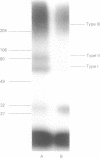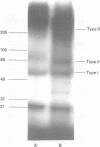Abstract
OBJECTIVES--Transforming growth factor beta (TGF-beta) is a multipotent regulator of cell proliferation and extracellular matrix production. The effect of TGF-beta on chondrocyte matrix production was studied in relation to the expression of TGF-beta binding proteins. The effect of TGF-beta on proteoglycan synthesis of isolated articular chondrocytes depended on the culture period. Proteoglycan synthesis of chondrocytes which were cultured for one day was inhibited by TGF-beta whereas proteoglycan synthesis of chondrocytes cultured in monolayer for seven days or longer was stimulated by TGF-beta. To investigate if this differential response is related to a distinct expression of TGF-beta receptors, this parameter was studied by affinity labelling. METHODS--Chondrocytes were incubated with 100 pM TGF-beta labelled with iodine-125. Crosslinking was performed using 0.25 mM disuccinimidyl suberate. Membrane proteins were extracted and analysed by denaturating sodium dodecylsulphate polyacrylamide gel electrophoresis (SDS-PAGE) and autoradiography. RESULTS--Freshly isolated and cultured chondrocytes expressed types I, II, and III TGF-beta receptors. The type II TGF-beta receptor of cultured chondrocytes appeared to be about 15 kilodaltons smaller than the type II TGF-beta receptor expressed on freshly isolated chondrocytes, however. CONCLUSIONS--As the type II TGF-beta receptors appears to be involved in signal transduction, this change in size of the type II TGF-beta receptor might be related to the differential effect of TGF-beta on proteoglycan synthesis of freshly isolated and cultured bovine articular chondrocytes.
Full text
PDF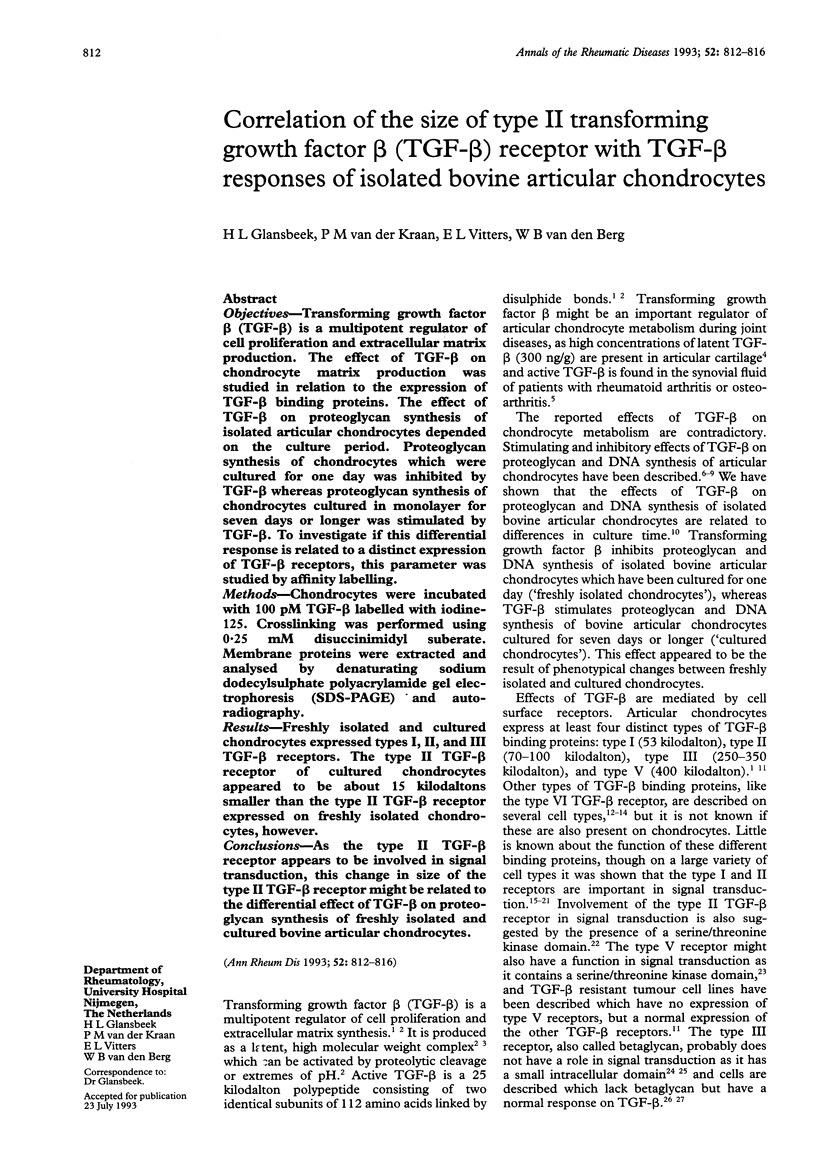
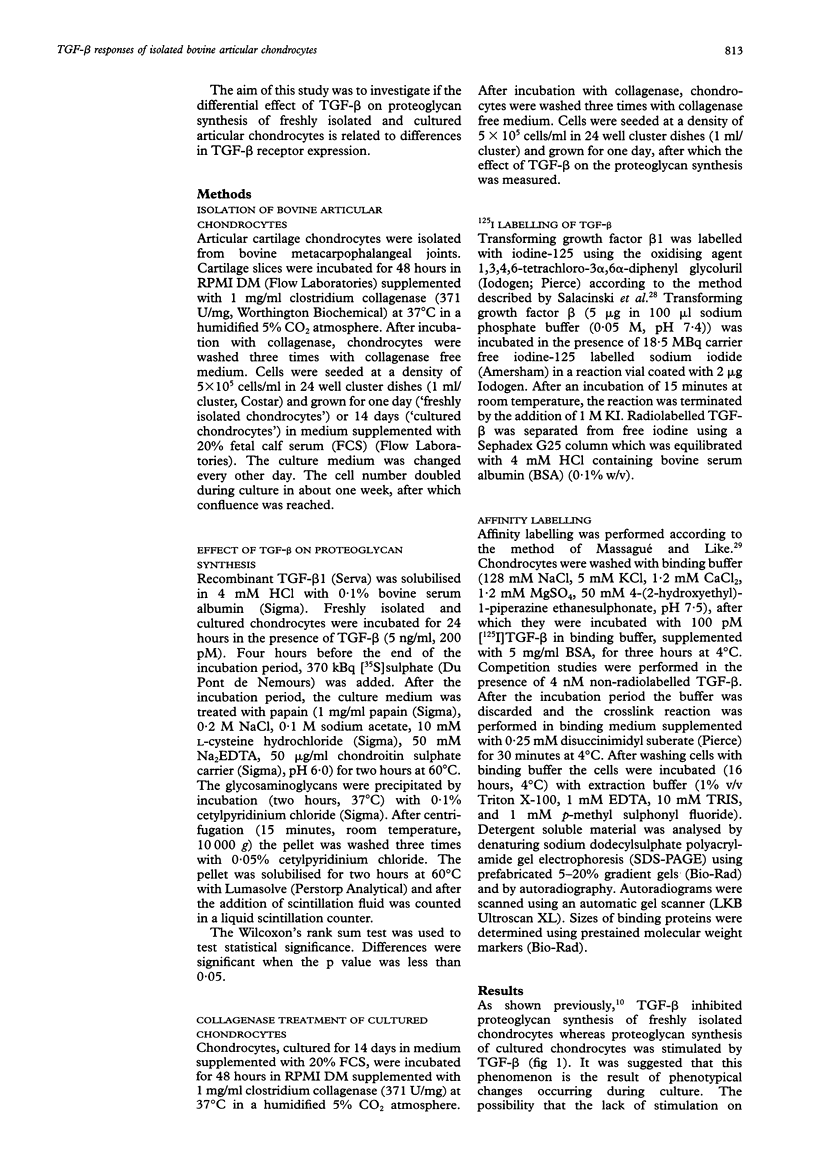
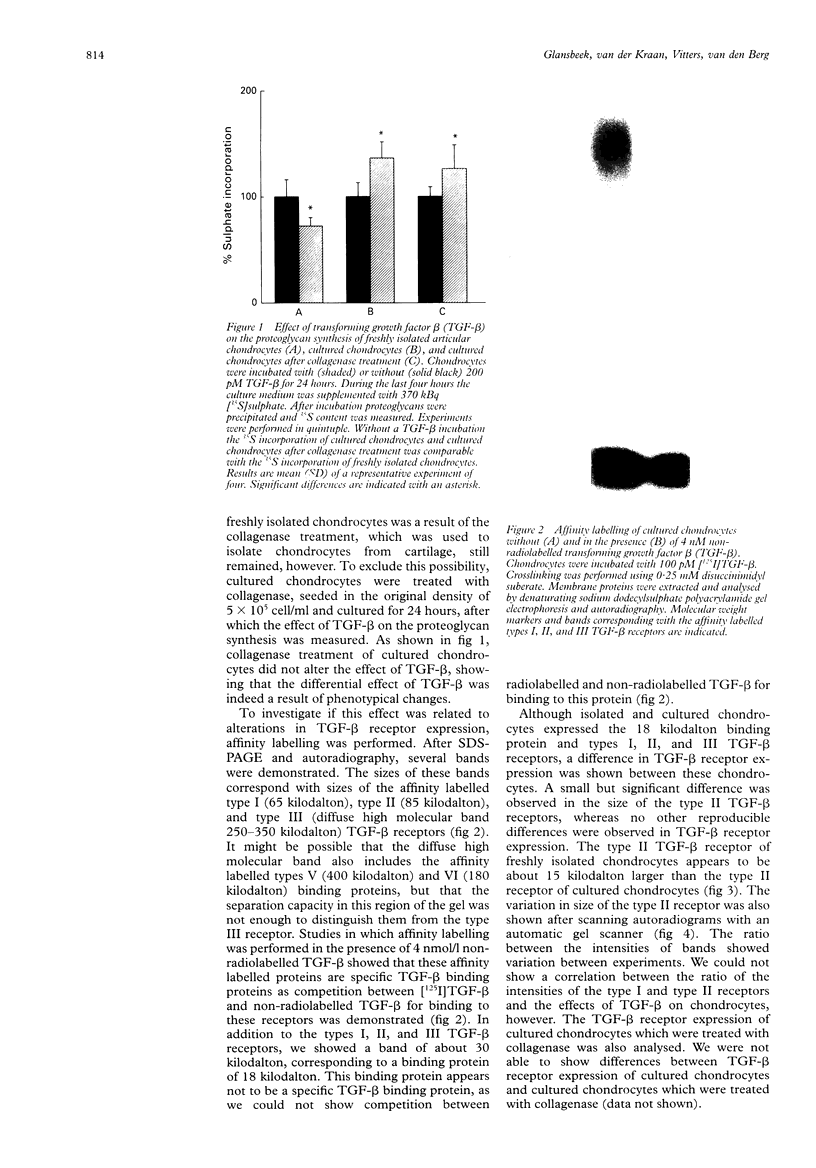
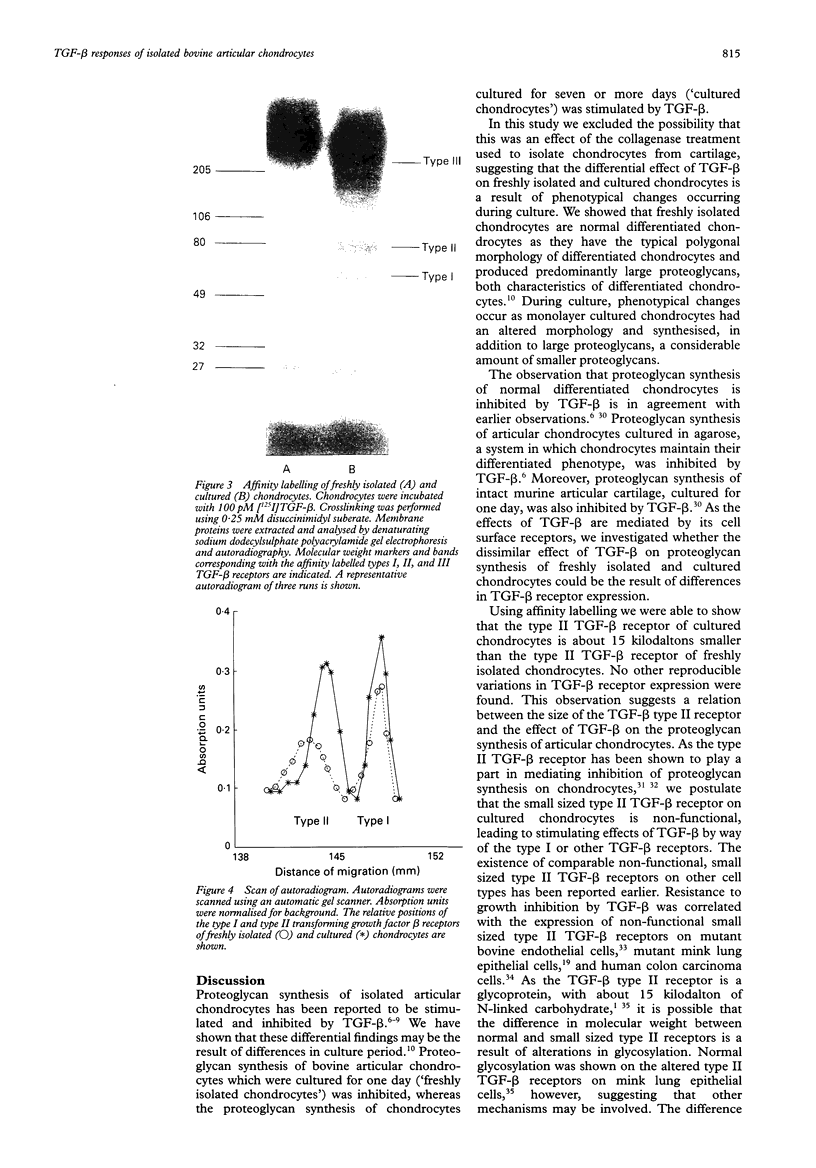
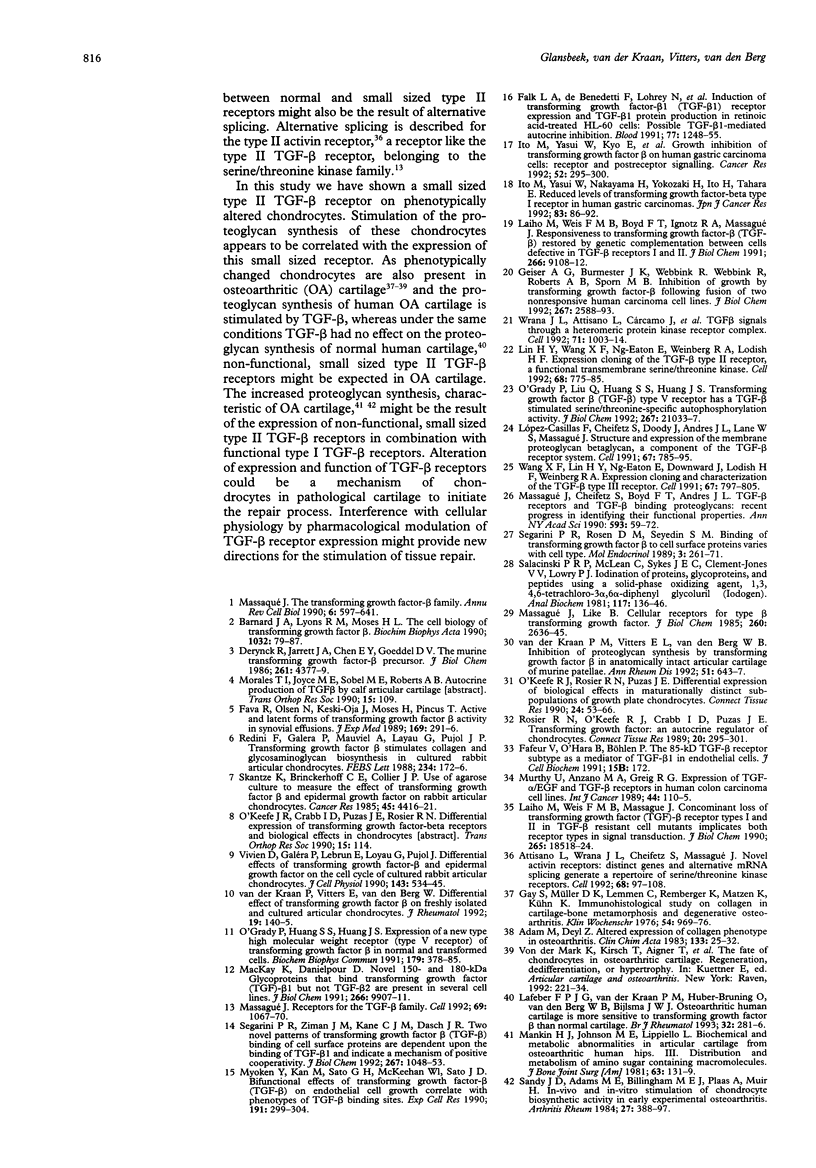
Images in this article
Selected References
These references are in PubMed. This may not be the complete list of references from this article.
- Adam M., Deyl Z. Altered expression of collagen phenotype in osteoarthrosis. Clin Chim Acta. 1983 Sep 15;133(1):25–32. doi: 10.1016/0009-8981(83)90017-7. [DOI] [PubMed] [Google Scholar]
- Attisano L., Wrana J. L., Cheifetz S., Massagué J. Novel activin receptors: distinct genes and alternative mRNA splicing generate a repertoire of serine/threonine kinase receptors. Cell. 1992 Jan 10;68(1):97–108. doi: 10.1016/0092-8674(92)90209-u. [DOI] [PubMed] [Google Scholar]
- Barnard J. A., Lyons R. M., Moses H. L. The cell biology of transforming growth factor beta. Biochim Biophys Acta. 1990 Jun 1;1032(1):79–87. doi: 10.1016/0304-419x(90)90013-q. [DOI] [PubMed] [Google Scholar]
- Derynck R., Jarrett J. A., Chen E. Y., Goeddel D. V. The murine transforming growth factor-beta precursor. J Biol Chem. 1986 Apr 5;261(10):4377–4379. [PubMed] [Google Scholar]
- Falk L. A., De Benedetti F., Lohrey N., Birchenall-Roberts M. C., Ellingsworth L. W., Faltynek C. R., Ruscetti F. W. Induction of transforming growth factor-beta 1 (TGF-beta 1), receptor expression and TGF-beta 1 protein production in retinoic acid-treated HL-60 cells: possible TGF-beta 1-mediated autocrine inhibition. Blood. 1991 Mar 15;77(6):1248–1255. [PubMed] [Google Scholar]
- Fava R., Olsen N., Keski-Oja J., Moses H., Pincus T. Active and latent forms of transforming growth factor beta activity in synovial effusions. J Exp Med. 1989 Jan 1;169(1):291–296. doi: 10.1084/jem.169.1.291. [DOI] [PMC free article] [PubMed] [Google Scholar]
- Gay S., Müller P. K., Lemmen C., Remberger K., Matzen K., Kühn K. Immunohistological study on collagen in cartilage-bone metamorphosis and degenerative osteoarthrosis. Klin Wochenschr. 1976 Oct 15;54(20):969–976. doi: 10.1007/BF01468947. [DOI] [PubMed] [Google Scholar]
- Geiser A. G., Burmester J. K., Webbink R., Roberts A. B., Sporn M. B. Inhibition of growth by transforming growth factor-beta following fusion of two nonresponsive human carcinoma cell lines. Implication of the type II receptor in growth inhibitory responses. J Biol Chem. 1992 Feb 5;267(4):2588–2593. [PubMed] [Google Scholar]
- Ito M., Yasui W., Kyo E., Yokozaki H., Nakayama H., Ito H., Tahara E. Growth inhibition of transforming growth factor beta on human gastric carcinoma cells: receptor and postreceptor signaling. Cancer Res. 1992 Jan 15;52(2):295–300. [PubMed] [Google Scholar]
- Ito M., Yasui W., Nakayama H., Yokozaki H., Ito H., Tahara E. Reduced levels of transforming growth factor-beta type I receptor in human gastric carcinomas. Jpn J Cancer Res. 1992 Jan;83(1):86–92. doi: 10.1111/j.1349-7006.1992.tb02356.x. [DOI] [PMC free article] [PubMed] [Google Scholar]
- Laiho M., Weis F. M., Boyd F. T., Ignotz R. A., Massagué J. Responsiveness to transforming growth factor-beta (TGF-beta) restored by genetic complementation between cells defective in TGF-beta receptors I and II. J Biol Chem. 1991 May 15;266(14):9108–9112. [PubMed] [Google Scholar]
- Laiho M., Weis M. B., Massagué J. Concomitant loss of transforming growth factor (TGF)-beta receptor types I and II in TGF-beta-resistant cell mutants implicates both receptor types in signal transduction. J Biol Chem. 1990 Oct 25;265(30):18518–18524. [PubMed] [Google Scholar]
- Lin H. Y., Wang X. F., Ng-Eaton E., Weinberg R. A., Lodish H. F. Expression cloning of the TGF-beta type II receptor, a functional transmembrane serine/threonine kinase. Cell. 1992 Feb 21;68(4):775–785. doi: 10.1016/0092-8674(92)90152-3. [DOI] [PubMed] [Google Scholar]
- López-Casillas F., Cheifetz S., Doody J., Andres J. L., Lane W. S., Massagué J. Structure and expression of the membrane proteoglycan betaglycan, a component of the TGF-beta receptor system. Cell. 1991 Nov 15;67(4):785–795. doi: 10.1016/0092-8674(91)90073-8. [DOI] [PubMed] [Google Scholar]
- Mankin H. J., Johnson M. E., Lippiello L. Biochemical and metabolic abnormalities in articular cartilage from osteoarthritic human hips. III. Distribution and metabolism of amino sugar-containing macromolecules. J Bone Joint Surg Am. 1981 Jan;63(1):131–139. [PubMed] [Google Scholar]
- Massagué J., Cheifetz S., Boyd F. T., Andres J. L. TGF-beta receptors and TGF-beta binding proteoglycans: recent progress in identifying their functional properties. Ann N Y Acad Sci. 1990;593:59–72. doi: 10.1111/j.1749-6632.1990.tb16100.x. [DOI] [PubMed] [Google Scholar]
- Massagué J., Like B. Cellular receptors for type beta transforming growth factor. Ligand binding and affinity labeling in human and rodent cell lines. J Biol Chem. 1985 Mar 10;260(5):2636–2645. [PubMed] [Google Scholar]
- Massagué J. Receptors for the TGF-beta family. Cell. 1992 Jun 26;69(7):1067–1070. doi: 10.1016/0092-8674(92)90627-o. [DOI] [PubMed] [Google Scholar]
- Massagué J. The transforming growth factor-beta family. Annu Rev Cell Biol. 1990;6:597–641. doi: 10.1146/annurev.cb.06.110190.003121. [DOI] [PubMed] [Google Scholar]
- Murthy U., Anzano M. A., Greig R. G. Expression of TGF-alpha/EGF and TGF-beta receptors in human colon carcinoma cell lines. Int J Cancer. 1989 Jul 15;44(1):110–115. doi: 10.1002/ijc.2910440120. [DOI] [PubMed] [Google Scholar]
- Myoken Y., Kan M., Sato G. H., McKeehan W. L., Sato J. D. Bifunctional effects of transforming growth factor-beta (TGF-beta) on endothelial cell growth correlate with phenotypes of TGF-beta binding sites. Exp Cell Res. 1990 Dec;191(2):299–304. doi: 10.1016/0014-4827(90)90018-6. [DOI] [PubMed] [Google Scholar]
- O'Grady P., Huang S. S., Huang J. S. Expression of a new type high molecular weight receptor (type V receptor) of transforming growth factor beta in normal and transformed cells. Biochem Biophys Res Commun. 1991 Aug 30;179(1):378–385. doi: 10.1016/0006-291x(91)91381-l. [DOI] [PubMed] [Google Scholar]
- O'Grady P., Liu Q., Huang S. S., Huang J. S. Transforming growth factor beta (TGF-beta) type V receptor has a TGF-beta-stimulated serine/threonine-specific autophosphorylation activity. J Biol Chem. 1992 Oct 15;267(29):21033–21037. [PubMed] [Google Scholar]
- O'Keefe R. J., Rosier R. N., Puzas J. E. Differential expression of biological effects in maturationally distinct subpopulations of growth plate chondrocytes. Connect Tissue Res. 1990;24(1):53–66. doi: 10.3109/03008209009152422. [DOI] [PubMed] [Google Scholar]
- Redini F., Galera P., Mauviel A., Loyau G., Pujol J. P. Transforming growth factor beta stimulates collagen and glycosaminoglycan biosynthesis in cultured rabbit articular chondrocytes. FEBS Lett. 1988 Jul 4;234(1):172–176. doi: 10.1016/0014-5793(88)81327-9. [DOI] [PubMed] [Google Scholar]
- Rosier R. N., O'Keefe R. J., Crabb I. D., Puzas J. E. Transforming growth factor beta: an autocrine regulator of chondrocytes. Connect Tissue Res. 1989;20(1-4):295–301. doi: 10.3109/03008208909023900. [DOI] [PubMed] [Google Scholar]
- Sandy J. D., Adams M. E., Billingham M. E., Plaas A., Muir H. In vivo and in vitro stimulation of chondrocyte biosynthetic activity in early experimental osteoarthritis. Arthritis Rheum. 1984 Apr;27(4):388–397. doi: 10.1002/art.1780270405. [DOI] [PubMed] [Google Scholar]
- Segarini P. R., Rosen D. M., Seyedin S. M. Binding of transforming growth factor-beta to cell surface proteins varies with cell type. Mol Endocrinol. 1989 Feb;3(2):261–272. doi: 10.1210/mend-3-2-261. [DOI] [PubMed] [Google Scholar]
- Segarini P. R., Ziman J. M., Kane C. J., Dasch J. R. Two novel patterns of transforming growth factor beta (TGF-beta) binding to cell surface proteins are dependent upon the binding of TGF-beta 1 and indicate a mechanism of positive cooperativity. J Biol Chem. 1992 Jan 15;267(2):1048–1053. [PubMed] [Google Scholar]
- Skantze K. A., Brinckerhoff C. E., Collier J. P. Use of agarose culture to measure the effect of transforming growth factor beta and epidermal growth factor on rabbit articular chondrocytes. Cancer Res. 1985 Sep;45(9):4416–4421. [PubMed] [Google Scholar]
- Vivien D., Galéra P., Lebrun E., Loyau G., Pujol J. P. Differential effects of transforming growth factor-beta and epidermal growth factor on the cell cycle of cultured rabbit articular chondrocytes. J Cell Physiol. 1990 Jun;143(3):534–545. doi: 10.1002/jcp.1041430319. [DOI] [PubMed] [Google Scholar]
- Wrana J. L., Attisano L., Cárcamo J., Zentella A., Doody J., Laiho M., Wang X. F., Massagué J. TGF beta signals through a heteromeric protein kinase receptor complex. Cell. 1992 Dec 11;71(6):1003–1014. doi: 10.1016/0092-8674(92)90395-s. [DOI] [PubMed] [Google Scholar]
- van der Kraan P. M., Vitters E. L., van den Berg W. B. Inhibition of proteoglycan synthesis by transforming growth factor beta in anatomically intact articular cartilage of murine patellae. Ann Rheum Dis. 1992 May;51(5):643–647. doi: 10.1136/ard.51.5.643. [DOI] [PMC free article] [PubMed] [Google Scholar]
- van der Kraan P., Vitters E., van den Berg W. Differential effect of transforming growth factor beta on freshly isolated and cultured articular chondrocytes. J Rheumatol. 1992 Jan;19(1):140–145. [PubMed] [Google Scholar]



